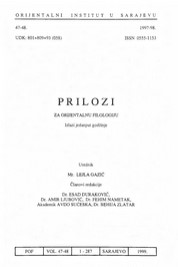NEGACIJA U TURSKOME JEZIKU
NEGATIVES IN THE TURKISH LANGUAGE
Author(s): Ekrem ČauševićSubject(s): Theoretical Linguistics, Syntax, Semantics, Comparative Linguistics, South Slavic Languages, Philology, Turkic languages
Published by: Orijentalni Institut u Sarajevu
Keywords: Negative; Turkish language; Bosnian language; Semantic analysis;
Summary/Abstract: In this paper, the author tried to give a detailed description of the change of negatives in the Turkish and Bosnian languages. Naturally, the contrasting was done from the aspect of the Turkish language. The procedures of negating were analyzed at three levels: at the level of sentence parts, the sentence and text levels. Within these, the following negatives were studied: v. suffix -me/-ma, predicative/modal word yok, predicative/mođal work değil, modal words hayır and hiç, and the conjunction ne...ne (de). Considerable attention was paid to the types of negative sentences. Their semantic equivalents in the Bosniak language were also analyzed. A contrastive approach proved extremely important because of the large number of Turkish (non-complex) sentences (e.g. Değil yazmak, okumak bile bilmiyor), whose semantic equivalents in the Bosniak language are different kinds of independent clauses. Within the framework of semantic analysis of negative sentences, the author tried to give the basic suggestions for their classification according to the presence of modal elements in meaning.
Journal: Prilozi za orijentalnu filologiju
- Issue Year: 1996
- Issue No: 44-45
- Page Range: 51-66
- Page Count: 16
- Language: Bosnian

